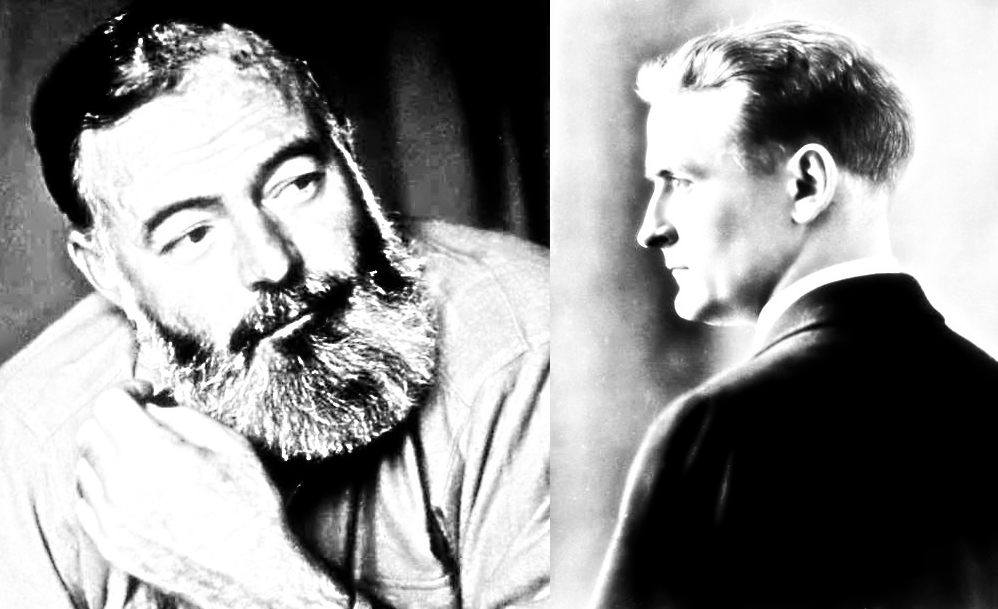I’m no fatalist. My estimation of spirits, ghosts, gods, demons, souls, and magic falls somewhere between hogwash and humbug … but I am delighted by certain notions of the so-called supernatural and the corporeally inexplicable.
Of all the world’s interesting coincidences, self-fulfilling prophesies, and seemingly uncanny interrelations, my favorite fodder transcendent falls among and between life and literature.
And the incidences of authorial prescience are as varied as they are bizarre.
For instance, 14 years before the Titanic went down, Morgan Robertson wrote an 1898 novella about an unsinkable super-sized luxury liner named “Titan”—which had too few lifeboats to save the bulk of its fictional passengers when it sank on its maiden voyage.
The year the Civil War ended, author Jules Verne wrote a story about an American spacecraft visiting the moon. His descriptions would closely resemble the Apollo lunar mission.
In one of my most favorite books—Fahrenheit 451, published in 1953— Ray Bradbury predicted with unnerving exactness the phenomena of future peoples eschewing books and intellectual pursuits in lieu of nonstop mindless entertainment.
How many hours did you spend on TikTok last month?
Bradbury sums up the book’s theme in one simple line of dialogue when discussing the firemen who burn the houses of people found to have committed the crime of owning books: “Remember, the firemen are rarely necessary. The public itself stopped reading of its own accord.”
But the creepiest of all for me is the apparently incidental quasi-prediction Robert M. Pirsig made in his novel Zen and the Art of Motorcycle Maintenance (ZAMM).
For the nescient, ZAMM is the mostly true story of a father-son motorcycle trip that’s part travelogue, and part philosophical treatise. As the author points out in his foreword, the book has very little to do with motorcycle maintenance and even less to do with Buddhism.
Nevertheless, Pirsig’s is a book I return to again and again because I find his observations and conclusions comforting in their analytical sterility and accessible profundity.
What haunts me is something I stumbled upon years after my initial reading of the book.
ZAMM takes place in 1968, when Pirsig’s son Chris was 11 years old.
Pirsig writes of a minor incident that occurred around the campfire one night after a long day’s ride. Tired and cranky, Chris has a bit of a tantrum and refuses to eat. He storms off, complaining of a stomachache.
Embarrassed by the outburst, Pirsig tells the married couple accompanying them that Chris had been having terrible stomach pains to the point where he and his wife had to take him to the hospital and that, after a series of tests, the doctors found the issue to be psychosomatic.
Despite being haunted by his own history of schizophrenia treatment, Pirsig seems to view Chris’ mental issues as a form of crying wolf. And yet he references an old German poem by Johann Wolfgang von Goethe, entitled, Erlkönig or “Elf King,” which belies his initial explanation to family friends.
The story concerns a father and son horsebound for home on a dark night in the forest.
Despite the child’s terrified pleas that the evil Elf King is threatening to kill him, the father assures the boy that what he really sees is the mist, what he really hears is the wind in the leaves. When they arrive home, the father finds his child dead.
What I didn’t know until 2017, when Robert M. Pirsig passed, was that his son Chris had died in 1979—five years after ZAMM was published.
Chris was stabbed to death outside the Zen temple where he had been living and studying.
That Chris suffered mental illness which manifested, as many concerns in children do, as stomach ailments, meant nothing by itself. But Pirsig’s inexplicable reference to the Elf King poem immediately came to my mind when I read of Chris’ death.
A father and son on horseback, or in Pirsig’s case—motorcycle.A boy warning of impending doom. Chris’ psychosomatic stomach pains, and later being stabbed in the chest.
I know it’s a stretch.
There’s no evidence to suggest Pirsig ever made such a connection before or after the fact.
It certainly wasn’t intentional.
And yet I can’t seem to shake this vague sense of MothmanProphesy.
For now, I’ll have to assume this was yet another case of accidental prescience … or was it?
What sorts of strange and unintended connections have you made between art and the real world?







